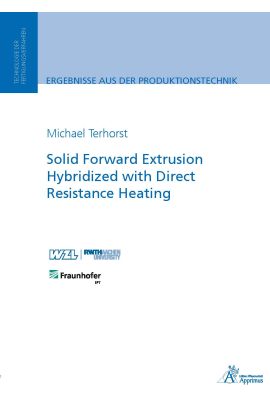Chevron cracks in cold solid forward extrusion occur once the full extent of workpiece formability is exhausted. Chevron cracks must be avoided as they significantly reduce the load-carrying capacity of a component. One way to avoid them is to carry out forming operations at elevated temperatures, e.g. warm forming. In conventional warm solid forward extrusion, the workpiece is heated before entering the forming tool, i.e. prior to the forming operation, typically in a furnace. Here, the whole workpiece is subjected to heat even though chevron cracks occur locally around shafts with small diameters. Workpiece areas that are not susceptible to cracking do not require heating. The excessive heat energy input in conventional solid forward extrusion wastes energy. Bearing in mind the rising energy prices and the call for energy efficiency, it becomes ecologically worthwhile to focus the heat on the crack-susceptible area of warm solid forward extruded workpieces. As a side effect, localized heat energy input would increase the dimensional accuracy and maintain the advantageous component properties such as strain hardening in workpiece areas that remain cool.
The objective of this dissertation is the development and analysis of an energy-efficient warm solid forward extrusion process for chevron crack avoidance. Localized heating is achieved by integrating direct resistance heating into the forming process. In this hybridized process, electrical resistance heating and extrusion are executed simultaneously. The abstract concept of hybridization goes back to the coexistence and interactions of electro-thermal and thermo-mechanical phenomena. The operational capability and benefit of the developed process is demonstrated on the basis of FE analysis and experimental hybridized extrusion.
| Autor | Terhorst, Michael |
|---|---|
| Lieferzeit | 3-4 Tage |
| Gewicht | 0.25 kg |
| Erscheinungsdatum | 20.11.2015 |

